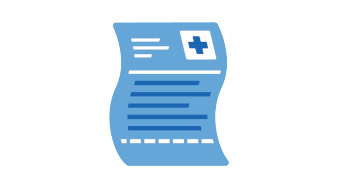The South West Genomic Laboratory Hub (SWGLH) offers the following genomic tests for patients with solid tumours, neurological tumours, sarcoma and tumours in children and young adults:
- Gene panels, FISH and direct mutation tests for solid tumours, neurological tumours, sarcoma and tumours in children and young adults , including lymphoma. Follow the sequential steps on this page below.
- Whole genome sequencing for any solid tumour in children and young adults or sarcoma: Please see page requesting a whole genome sequencing test
Step 1 Check patient eligibility
- Eligible tumours and the available tests are shown in the National Genomic Test Directory for Cancer (NGTD) Only tests specified by the National Genomic Test Directory are funded, please note the M-code for the required investigation.
- Genomic testing for tumours is rapidly advancing. The SWGLH is implementing new technologies such as a large gene panel test that detect single nucleotide changes, copy number changes, and gene fusions. The strategy aims to provide timely results for multiple tumour types that are relevant for clinical care and entry into trials.
Step 2 Collect the sample(s)
- Please ensure that the patient's identity is verified prior to taking the sample.
- Gene panel and direct mutation tests will be performed on FFPE samples obtained at biopsy or surgical resection, or from cytology samples
- Samples should be prepared by the local Pathology lab and forwarded to the SWGLH with minimal delay.
- The Pathologist’s assessment of neoplastic cell content of the sample is essential to ensure suitability for genomic testing.
- Sample requirements as follows:
- For DNA or RNA extraction only
- Sample with >20% neoplastic cells: send one tube (Eppendorf or Universal): containing 5 x 10µm sections (curls/scrolls)
- OR Sample with <20% neoplastic cells: send 10 x 5µm slide mounted sections along with H&E with regions of >20% neoplastic cells highlighted.
- For DNA and RNA extraction
- Sample with >20% neoplastic cells: send two tubes (Eppendorf or Universal): each containing 5 x 10µm sections (curls/scrolls)
- Sample with <20% neoplastic cells: send 20 x 5µm slide mounted sections along with H&E with regions of >20% neoplastic cells highlighted.
- For FISH
- Please send 2 x 4µm and 2 x 2µm sections on 'APES' or 'sticky' slides per test required with an accompanying H&E slide with the appropriate tumour rich area(s) marked.
- For DNA or RNA extraction only
Indication M4.5 Blood samples for circulating tumour DNA analysis should be sent directly to the Royal Marsden Hospital. Further information, including referral forms, can be accessed via the following website:
- Further information in the form of SWGLH guidance documents for Clinician's and Pathologists can be found in the blocks at bottom of this page
Step 3 Complete the request form
- In the instance of a Sarcoma please use this request form
- All samples for genomic testing for non-haematological tumours should be accompanied by a fully completed SWGLH form
- For neuropathology requests please complete this request form
- The M-code should be included to identify which test is required.
- The request form should clearly state who the report should be sent to. Reports will be issued by email. Multiple email addresses may be included (e.g. the referring clinician, pathologist, and MDT coordinator)
- The request should be sent to your local Pathology lab to activate the preparation of samples for genomic testing.
Step 4 Transportation of sample and request form to the SWGLH
- As soon as possible after local processing and assessment, samples should be transported rapidly to the SWGLH Bristol Genetics Laboratory using one of the rapid transport routes that have been established from all SW Trusts
- Please refer to the SWGLH Sample Requirements and Transport page for further information
Step 5 What are the turnaround times for the test?
- We aim to report gene panel tests within 7-10 working days of sample receipt at the SWGLH to help ensure that results available to clinicians to guide selection of treatment for cancer.
- When special circumstances require a more urgent result, a rapid single gene test may be performed instead of a gene panel. Clinicians or Pathologists should contact the Bristol Genetics laboratory directly to access this service.
SWGLH Solid Tumour Clinical Scientist Team Contact Info

SWGLHcancer@nbt.nhs.uk or by telephone at 0117 414 6168
SWGLH Solid Tumour Request Forms
Download request forms
The referenced media source is missing and needs to be re-embedded.
SWGLH Solid Tumour - Clinical Guides

Download a copy of the clinical guides
